Election Commission
ECI organises a virtual conference of Chief Electoral Officers
CEC emphasises voter centric services to be delivered swiftly &efficiently
General Elections 2019- An ATLAS released during the Conference
Posted On:
15 JUN 2021 6:56PM by PIB Delhi
Election Commission of India today organized a virtual conference of the Chief Electoral Officers of all the States and UTs. The conference primarily focused on key thematic issues like smooth, efficient and voter friendly services, updation/purity of the electoral roll, integration of IT Applications, extensive voter outreach program, Media & Communication strategy, Expenditure monitoring, legal issues, EVM and VVPAT storage related infrastructure and training & capacity building.
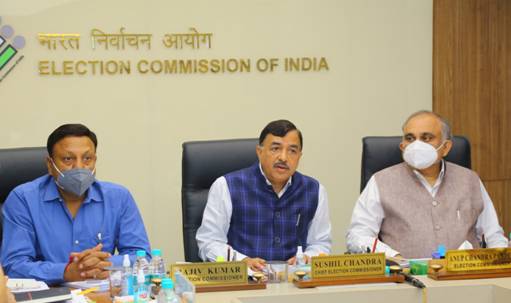
While addressing the CEOs, Chief Election Commissioner Sh. Sushil Chandra stressed the importance of such periodic review meetings for revamping back-end systems so that voter centric services can be delivered swiftly and efficiently on priority. Shri Chandra said that such CEO review meetings would be institutionalized and will be organized more frequently. Shri Chandra emphasized that CEOs should make sustained year round efforts to engage with new voters for registration and other services like correction, change of address etc for existing voters and awareness of hassle free facilitation platforms of Election Commission. He reiterated the importance of an updated and error free electoral roll. Shri Chandra asked the CEOs to share the best practices of the various innovative steps taken by the poll-gone states for learning and customization for future elections.
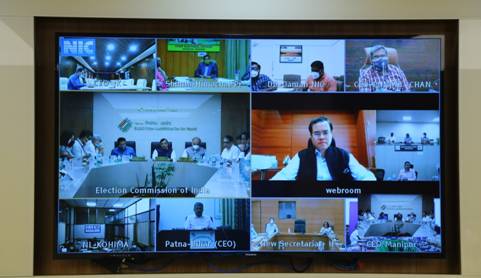
Election Commissioner Sh. Rajiv Kumar in his address said that CEOs of the recently poll-gone states should suggest ways of scaling up/integrating their successful best practices such as mobile appsfor absentee voters, criminal antecedents and randomization of polling /police personnel. He emphasized that protocols of SOPs for storage and movement of EVMs should be strictly adhered to and monitored by CEOs. He added that CEOs should ensure periodic physical inspection of EVM storage warehouses. Shri Kumar also said that CEOs should send their suggestions and ideas for new reforms to be taken up in the identified verticals being examined by the Core Committee.
Election Commissioner Sh. Anup Chandra Pandey commended the CEOs for their constructive suggestions. He said that the non-election period should be utilized by CEOs to consolidate and fill up gaps of manpower resources and Infrastructure, plan for communication & awareness activities and step up training &capacity building as per their state specific needs.
Secretary General Sh. Umesh Sinha reminded the CEOs that during the non-election period, the core work of purifying electoral rolls, redressal of grievances of voters, outreach activities for engaging with young & future voters through Electoral Literacy Clubs and other SVEEP measures, staffing & budgeting matters, training of CEO office teams should be taken up on priority so that CEO offices remain in full readiness for forthcoming elections.
Senior DEC Shri Dharmendra Sharma, DECs Shri Sudeep Jain, Shri Chandra Bhushan Kumar and Shri Nitesh Vyas also interacted with CEOs on their specific thematic issues.
During the conference, Chief Electoral Officers of Assam, Kerala, Tamil Nadu and West Bengal shared their experiences and lessons from conducting elections during the pandemic. The CEOs of Goa, Manipur, Punjab, Uttarakhand& Uttar Pradesh particularly briefed the Commission about various challenges, innovations and suggestions for upcoming assembly elections in their respective states.
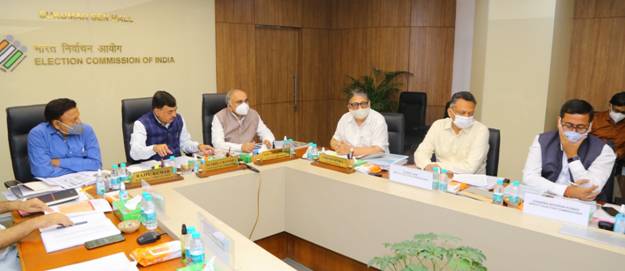
The Commission today during the review meeting also e-launched the ‘Atlas on General Elections 2019’. The Atlas encompasses all the data and statistical figures of this monumental event. This Atlas includes 42 thematic maps and 90 tables depicting various facets of the elections.The General Election 2019 Atlas serves as an informative and illustrative document that brings to light the nuances of the Indian electoral process. The maps and tables depict information in pictorial manner for better understanding and appreciation of the electoral diversity of the country. The Atlas brings out salient features such as data of the 23 states and UTs where women voting percentage was more than the male voting percentage; information about the largest parliamentary constituency in terms of electors, candidates and performance of political parties amongst other parameters. The e-Atlas is available at https://eci.gov.in/ebooks/eci-atlas/index.html. Any suggestions can be shared with the EDMD division of the Commission.
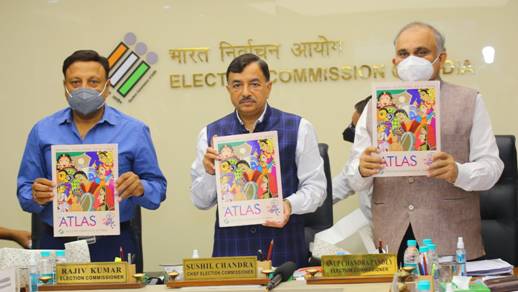
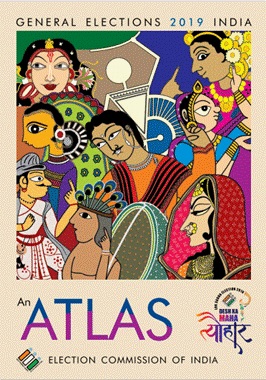
***
SBS/AC
(Release ID: 1727296)
Visitor Counter : 712